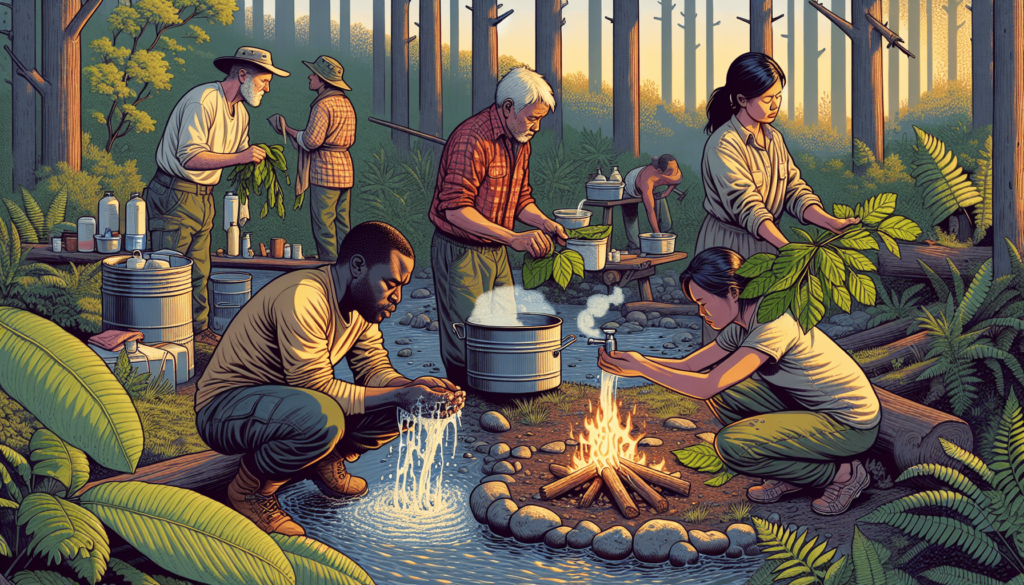When it comes to surviving in the wilderness, maintaining good hygiene practices is essential for your overall health and well-being. In this article, we’ll explore some practical tips and techniques that will help you stay clean and healthy in the midst of nature’s challenges. From proper hand hygiene to the importance of staying hydrated, we’ll cover it all. So grab your backpack and let’s dive into the world of wilderness hygiene together!

Importance of hygiene in wilderness survival
Surviving in the wilderness can be both challenging and exhilarating. While you may be focused on building a fire, setting up camp, and finding food and water sources, it’s important not to overlook the importance of hygiene. Practicing good hygiene in the wilderness is crucial for preventing diseases, promoting overall health and wellbeing, and ensuring a successful and enjoyable outdoor experience.
Prevention of diseases
When you’re out in the wilderness, you are exposed to various bacteria, parasites, and viruses that can cause serious illnesses. Maintaining good hygiene practices can significantly reduce the risk of contracting these diseases. By following proper hygiene protocols, you are not only protecting yourself but also your fellow adventurers.
Promotion of overall health and well-being
Good hygiene habits play a significant role in promoting overall health and well-being, even in the wilderness. By keeping yourself clean and practicing proper personal care, you are minimizing the chances of developing infections, skin issues, and other health problems that can hamper your ability to enjoy the outdoor experience fully. Taking care of your body also helps maintain mental and emotional well-being, allowing you to fully immerse yourself in the beauty of nature.
Water hygiene
Water is essential for survival, but it can also be a source of harmful bacteria and parasites. Maintaining water hygiene in the wilderness is crucial to prevent waterborne diseases. Here are some important tips to follow:
Always carry a water purification system
Invest in a reliable water purification system or water filter to ensure that the water you drink is safe and free from contaminants. Portable water filters or purification tablets are lightweight, easy to use, and can remove harmful bacteria and parasites from untreated water sources.
Avoid drinking water from potentially contaminated sources
Be cautious when selecting water sources in the wilderness. Avoid drinking from stagnant ponds, puddles, or streams near areas with livestock, human activity, or potential pollution sources. Instead, opt for fast-flowing rivers and springs, as they are less likely to be contaminated.
Boil water to kill harmful bacteria and parasites
If you don’t have access to a water purification system, boiling water is an effective way to kill harmful bacteria, viruses, and parasites. Boil water vigorously for at least one minute (or three minutes at higher altitudes) to ensure that it is safe for consumption.
Food hygiene
Proper food hygiene is essential to prevent foodborne illnesses, especially when you are relying on the food you forage or pack for your wilderness survival. Follow these guidelines to ensure you stay healthy:
Proper food storage to prevent spoilage and contamination
Store your food properly to prevent spoilage and contamination. Use airtight containers or sealable plastic bags to keep your food safe from insects, rodents, and other wilderness creatures. Keep perishable food items in a cooler with ice packs to maintain their freshness for a longer period.
Cook food thoroughly to kill bacteria
Cooking food thoroughly is essential to kill any bacteria present and reduce the risk of foodborne illnesses. Use a food thermometer to ensure that meat, poultry, and fish reach the appropriate internal temperature. Avoid eating raw or undercooked food, especially meat and seafood.
Avoid eating wild plants and mushrooms without proper identification
While foraging for food in the wilderness can be tempting, it is crucial to have proper knowledge and identification skills. Many wild plants and mushrooms can be poisonous or cause severe allergic reactions. Unless you are confident in your identification skills, it is recommended to avoid consuming wild plants and mushrooms altogether.
Personal hygiene
Maintaining personal hygiene in the wilderness is vital for staying healthy and preventing the spread of germs among your group. Here are some hygiene practices to incorporate into your wilderness survival routine:
Regular handwashing with soap or hand sanitizer
Handwashing is one of the most effective ways to prevent the spread of germs. Always wash your hands with soap and clean water for at least 20 seconds, especially before handling food, after using the restroom, or whenever they are visibly dirty. If water is scarce, use an alcohol-based hand sanitizer with at least 60% alcohol content.
Maintaining proper oral hygiene
Even in the wilderness, it is important to take care of your oral health. Brush your teeth at least twice a day with a toothbrush and toothpaste. If water is limited, use a small amount of water to rinse your mouth and spit away from water sources.
Cleaning and disinfecting cuts or wounds
If you sustain any cuts or wounds during your wilderness adventure, it is crucial to clean them properly to prevent infections. Rinse the wound with clean water, using a mild soap if available. Apply an antiseptic ointment and cover the wound with a sterile bandage or dressing.
Proper disposal of waste
Dispose of waste properly to minimize environmental impact and the spread of diseases. Follow the “Leave No Trace” principles and pack out all non-biodegradable waste. Dig a cat hole at least 200 feet away from water sources and your campsite to bury human waste. Use biodegradable toilet paper or consider using alternatives like leaves, stones, or wipes that can be packed out.

Campsite hygiene
Maintaining a clean and hygienic campsite is not only important for your own health but also for the preservation of the wilderness environment. Follow these guidelines to ensure a hygienic campsite:
Choose a campsite away from water sources
Select a campsite that is located at least 200 feet away from water sources such as rivers, lakes, or streams. This distance helps prevent polluting the water with waste and reduces the risk of contamination.
Dispose of waste in designated areas
Before setting up camp, locate designated waste disposal areas if available. Use these areas to dispose of non-biodegradable waste. If there are no designated areas, pack out all your waste and leave no trace of your passage.
Keep the campsite clean and free from food debris
Cleanliness is crucial in the wilderness. Keep your campsite clean by picking up any food debris or trash that might attract insects and wildlife. Properly store food items to prevent animals from being attracted to your campsite.
Properly store food to prevent attracting wildlife
To avoid attracting wild animals to your campsite, store your food properly. Use bear-resistant containers or hang food from a tree branch at least 10 feet off the ground and 4 feet away from the trunk.
Hygiene during toileting
Proper toileting practices are essential to prevent the contamination of water sources and the spread of diseases. Follow these guidelines when nature calls:
Dig a cat hole at least 6-8 inches deep for human waste
When nature calls, dig a cat hole at least 6-8 inches deep to bury your human waste. Choose a spot at least 200 feet away from water sources, trails, and your campsite. Bury toilet paper or use biodegradable alternatives like wipes, leaves, or rocks.
Pack out toilet paper or use biodegradable alternatives
To minimize environmental impact, pack out non-biodegradable toilet paper. If you prefer to use alternatives, ensure they are biodegradable and will not harm the environment.
Wash hands thoroughly after toileting
After toileting, always wash your hands with soap and clean water for at least 20 seconds, or use an alcohol-based hand sanitizer if water is limited. Avoid touching your face or handling food before washing your hands.
Personal care in the wilderness
Taking care of your personal hygiene in the wilderness is not only about staying clean but also about maintaining comfort and preventing health issues. Here are some personal care tips for your wilderness survival:
Maintain personal cleanliness with wet wipes or body wipes
In situations where water is limited or not easily accessible, wet wipes or body wipes are a convenient way to maintain personal cleanliness. Wipe down your body daily, paying attention to areas prone to sweat and odor.
Wear clean and dry clothing
Clean and dry clothing is essential for your comfort and well-being in the wilderness. Change into clean clothes regularly to prevent skin irritation and minimize odors. Keep your dirty clothes separately to avoid cross-contamination.
Proper foot care to prevent blisters or infections
Your feet are your most valuable asset in the wilderness. Take good care of them by wearing properly fitted and broken-in footwear. Avoid excessive moisture by changing into dry socks regularly. Treat any hot spots or blisters promptly to prevent infections.
Insect and pest control
Insects and pests can quickly become a nuisance and can even transmit diseases. Here are some measures to control insects and pests in the wilderness:
Use insect repellents to deter mosquitoes and ticks
Apply insect repellents containing DEET or picaridin to exposed skin and clothing to deter mosquitoes and ticks. Follow the instructions on the product label and reapply as necessary.
Check for ticks regularly
Ticks can transmit diseases such as Lyme disease. Check your body regularly for ticks, especially in areas where they are commonly found, such as warm, moist areas and areas with dense vegetation. If you find a tick, carefully remove it with tweezers, ensuring you remove the entire tick, including the head.
Keep the campsite free from trash or food scraps to avoid attracting pests
To prevent pests such as ants and rodents from invading your campsite, keep it clean and free from trash or food scraps. Dispose of waste properly and store food in airtight containers.
Maintaining clean equipment and gear
Keeping your equipment and gear clean is not only hygienic but also ensures their longevity and optimal performance. Follow these tips to maintain clean equipment and gear:
Regularly clean and disinfect cooking utensils
Properly clean and disinfect your cooking utensils after each use. Wash them with hot soapy water, rinse thoroughly, and allow them to air dry. Disinfect items that came into contact with raw meat to prevent cross-contamination.
Keep camping gear and equipment free from dirt and debris
Dirt and debris can accumulate on your camping gear and equipment, making them less effective and potentially causing damage. Routinely clean and remove any dirt or debris from your gear to maintain its functionality and extend its lifespan.
Inspect and clean water bottles and containers
Water containers often collect bacteria and residue over time. Inspect and clean your water bottles and containers regularly with warm soapy water. Rinse them thoroughly and allow them to dry before filling them with clean water.
First aid and medical hygiene
During wilderness survival, injuries and illnesses can occur. Proper first aid and medical hygiene practices are crucial in such situations. Here are some guidelines to follow:
Carry a well-stocked first aid kit
Always have a well-stocked first aid kit with you during your wilderness adventure. Ensure it contains essential items such as adhesive bandages, antiseptic wipes, gauze pads, medical tape, tweezers, and over-the-counter medications.
Regularly check and replace expired medications
Check the expiration dates of medications in your first aid kit regularly. Replace any expired medications to ensure their effectiveness when needed.
Practice proper wound care and dressings
In the event of an injury, practice proper wound care. Clean the wound with clean water and mild soap if available, apply an antiseptic ointment, and cover it with a sterile dressing. Regularly change the dressing and monitor the healing process.
Maintain personal hygiene even during injuries or illnesses
Even when you are injured or ill, it is crucial to maintain personal hygiene. If possible, continue practicing proper hand hygiene and cleanliness. Properly dispose of any medical waste, such as used wound dressings, to prevent the spread of infections.
By following these important hygiene practices in the wilderness, you can ensure a safe, healthy, and enjoyable outdoor experience. Remember, good hygiene is not only essential for your own well-being but also for the preservation of the wilderness environment. Stay clean, stay healthy, and embrace the wonders of nature.
